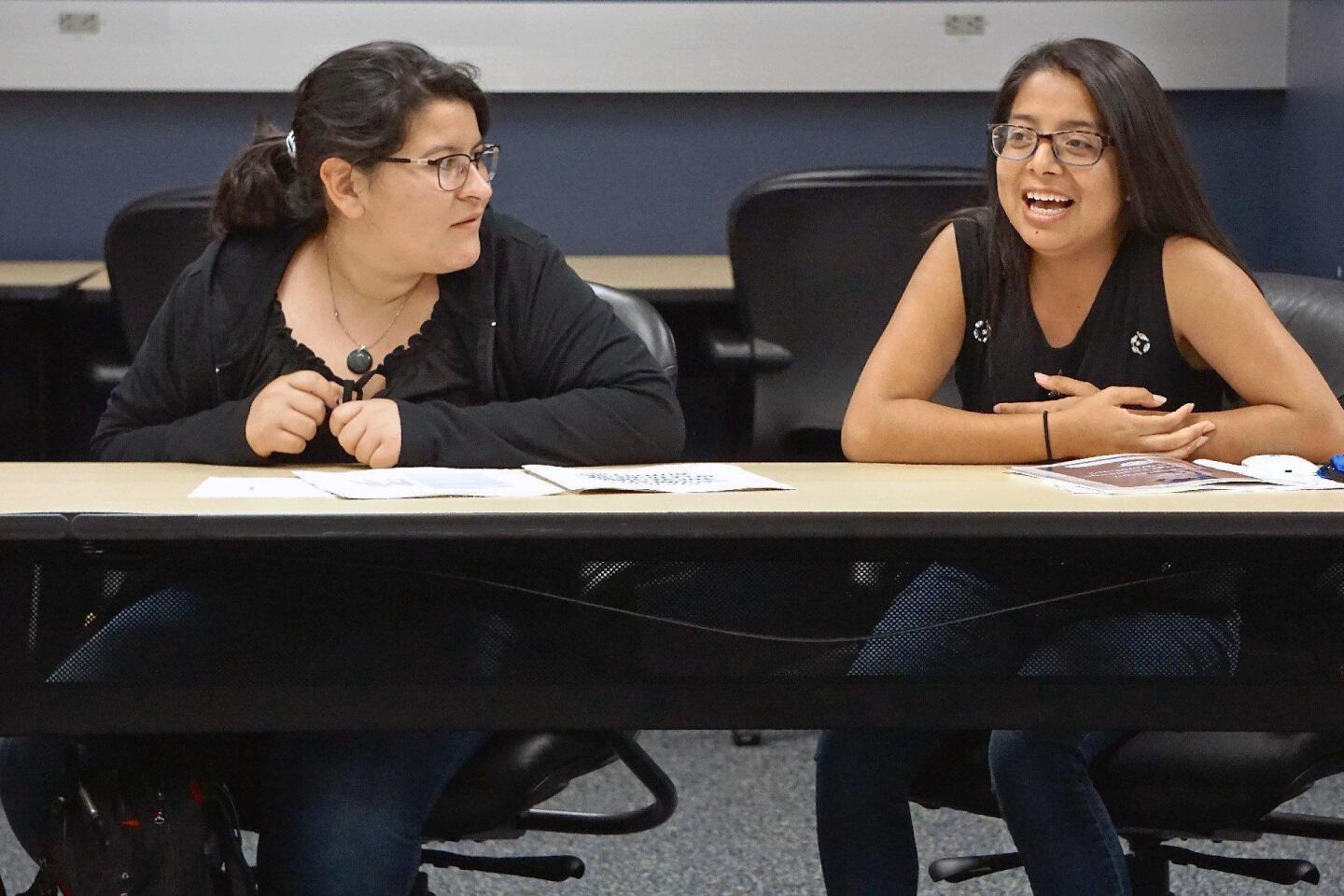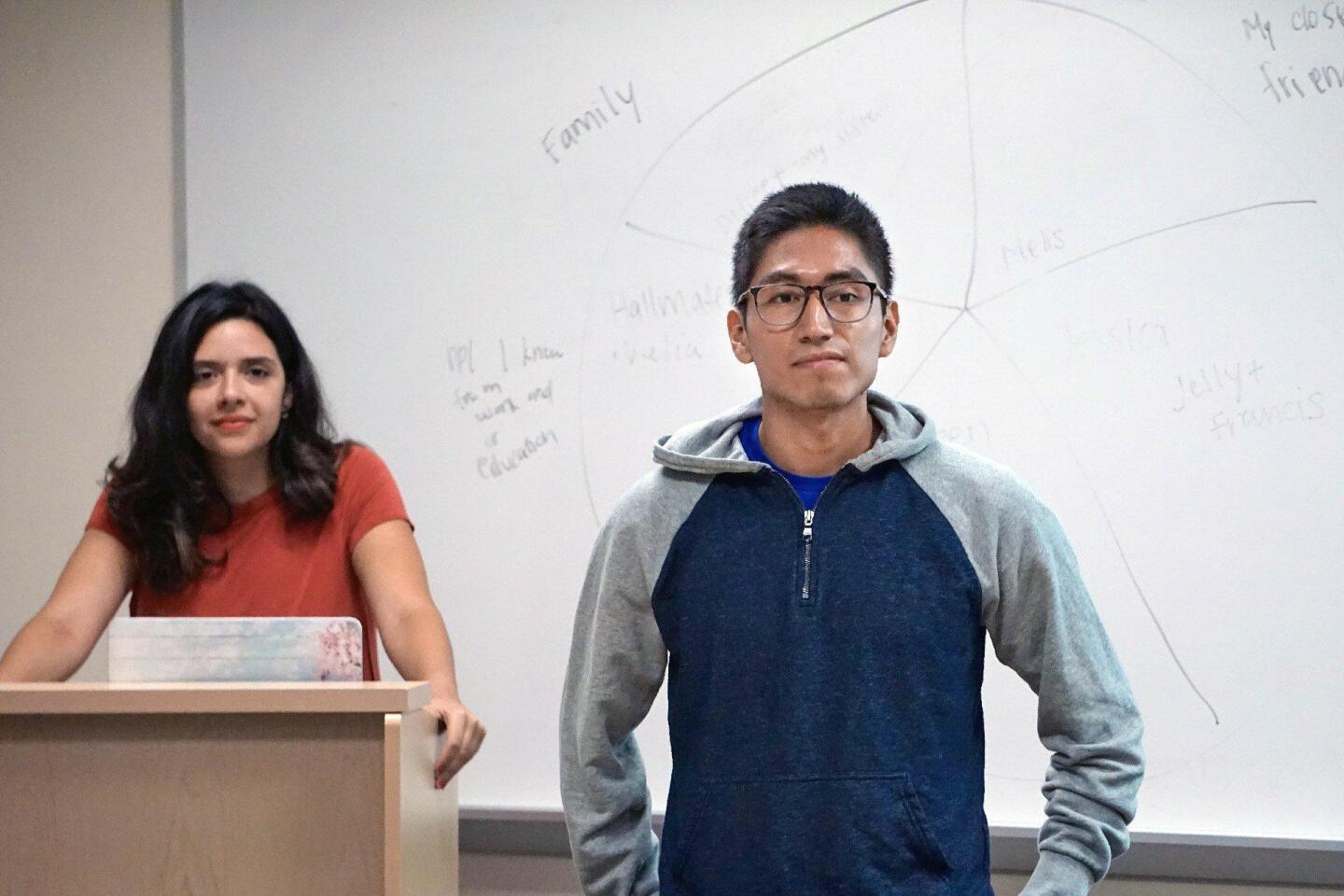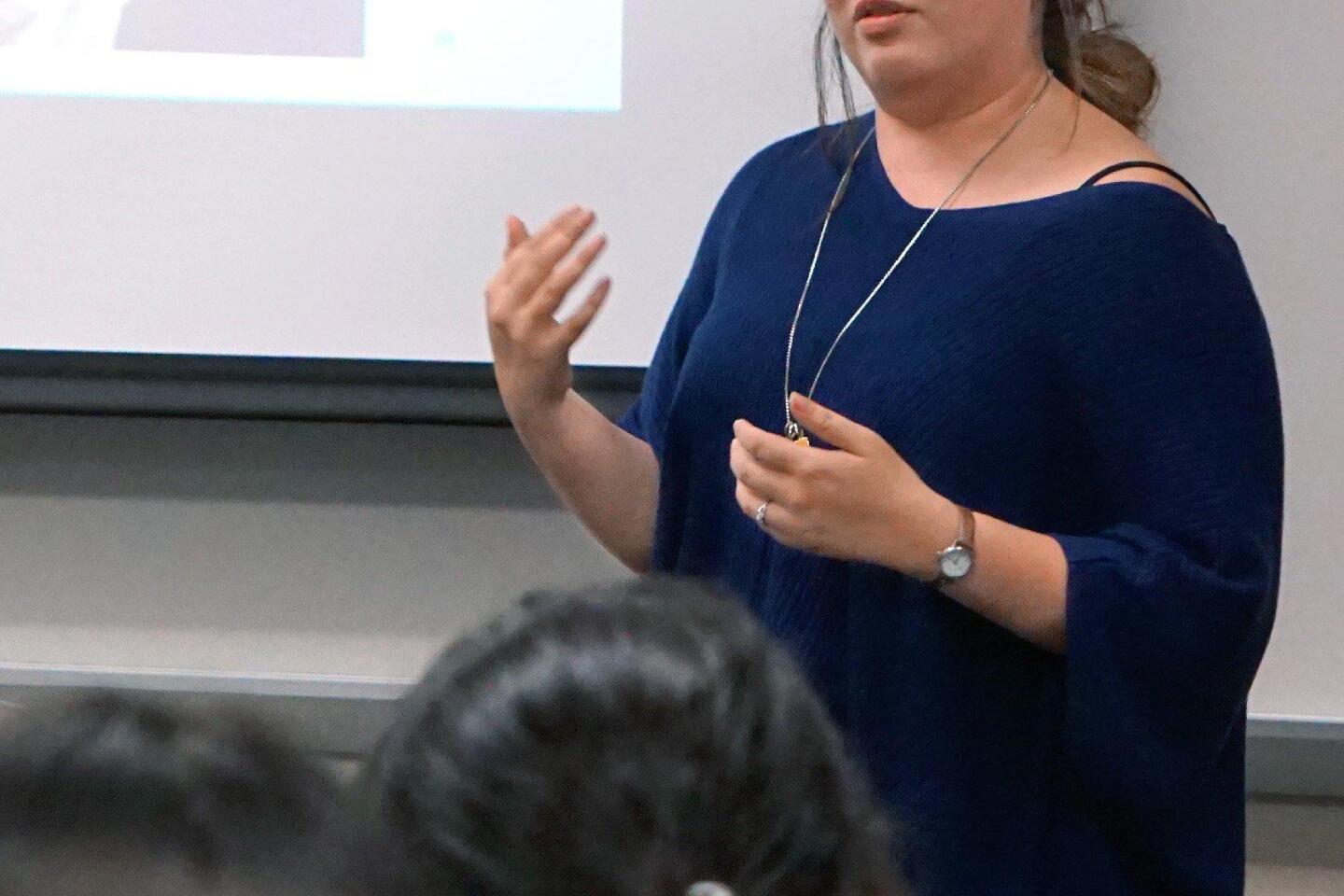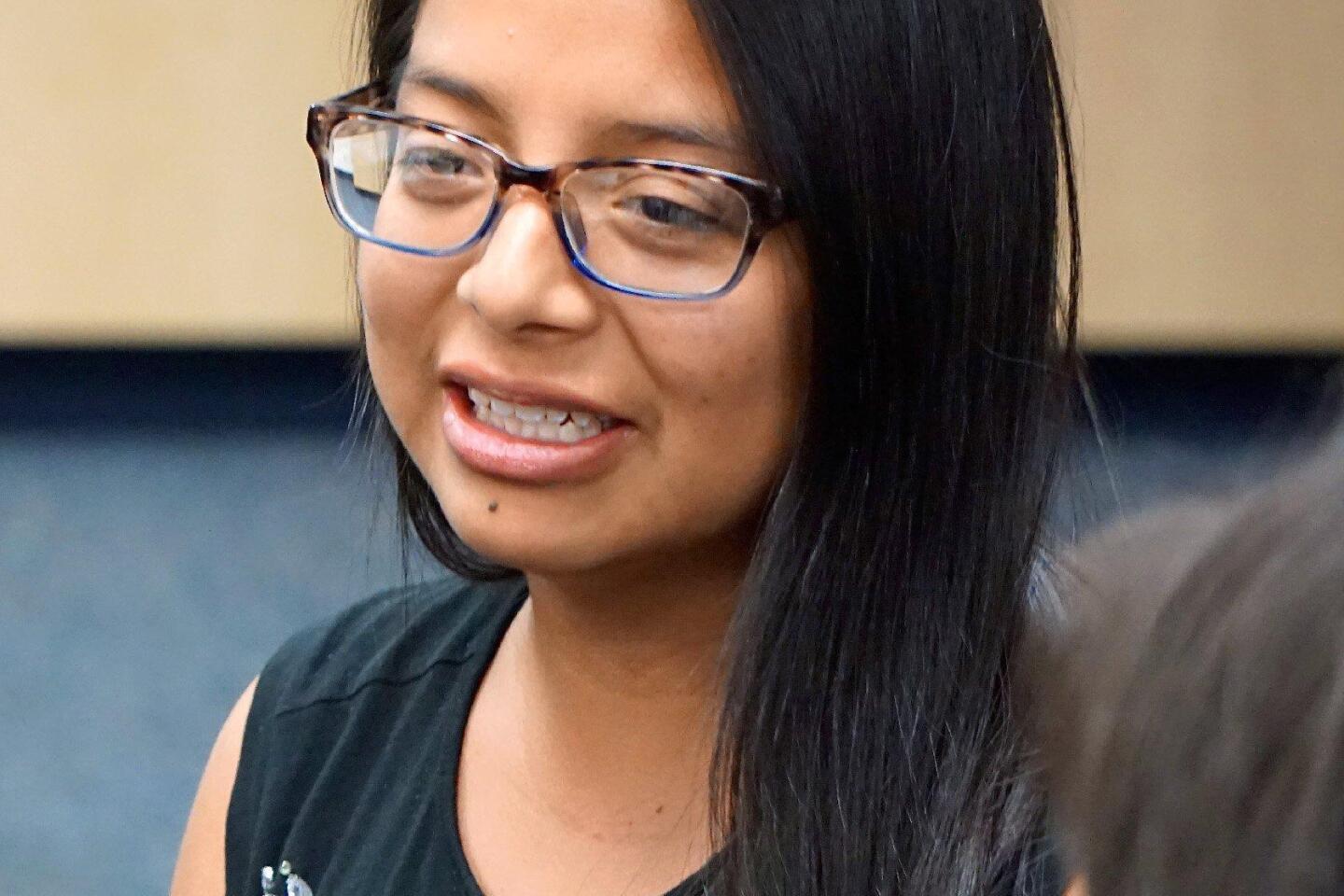UCI program helps first-generation freshmen feel they belong
- Share via
Anita Casavantes Bradford’s parents separated when she was 6, leaving her mother to raise her and her two sisters in Vancouver, Canada, on welfare and whatever work she could scrounge with only a high school education.
Casavantes Bradford would go on to become the first person in her family to complete college and later, in the U.S., a doctorate.
Today she is a nation away from the Canadian neighborhood in which she grew up, working for the last two years as a Chicano and Latino studies associate professor at UC Irvine, where she recently founded the First Generation First Quarter Challenge.
The series of workshops targets first-generation students — those whose parents did not obtain a four-year college degree — students who are like she once was.
First-gen students face an array of social and cultural challenges, including feeling like they don’t belong at a university, Casavantes Bradford said.
“The primary challenge, when talking about [first-gen students] across the board, is the same challenge anyone would face when moving to a foreign country and not having a map or not knowing the language or the social codes,” she said. “Would most of us eventually figure those things out? Yes. But would that first year be a profoundly lonely, alienating and confusing time? Yes.”
The pilot fall-quarter program at UCI has 65 social sciences students who meet weekly for workshops to familiarize them with campus resources, managing expenses, building peer relationships and working through stress and anxiety.
During workshops, the students are guided by eight first-gen upper-class members who also once questioned their rightful place at UCI.
Jeff Davis, an English professor at Sonoma State who has published work about the first-gen experience, said students with college-educated parents have 18 years of intuitive orientation to college through their family’s stories and tips.
The first-gen program, which is expected to expand beyond the social sciences students, seeks to close at least part of that 18-year gap of college familiarity.
Lasting lessons
When workshop leader Daisy Vera was 15 she was curious to know what immediately getting a job would be like compared to going to college
------------
FOR THE RECORD
An earlier version of this article incorrectly stated that Daisy Vera wasn’t interested in college when she was 15. In fact, Vera was curious about getting a job immediately compared to going immediately to college.
------------
Her father, a construction worker who dropped out of high school, decided to put her to the test.
The two woke up one morning in late August and drove from their home in Carson to a house her father was working on. Her father parked his truck and handed her a shovel so she could scoop sand from the bed to the ground.
“I remember being under the hot sun,” Vera said, recalling the blisters she earned that day seven years ago. “My dad said, ‘It might not be this [construction work] you end up doing, but it will be tiresome … Do you really not want to go to college?’”
She did. And her father’s words still cling: “You could be sitting in a nice desk, in a nice classroom.”
Vera, now a 22-year-old in her fifth year at UCI, ended up in that classroom alongside the sons and daughters of attorneys, accountants and doctors. But that seat she earned didn’t always feel like home.
“I remember my intro to [political science] class and there was this one guy who was very polished,” she recalled. “He wore a knit sweater with a collared shirt underneath … and talked about his dad’s country club and how his dad knew this congressman like it was no big deal.”
She asked herself, “Why am I here?”
Then she took a class from a professor who once lived in a trailer park in Vancouver and learned that she too was the first in her family to go to college.
“[Professor Casavantes] helped me see that while, yes, I’m the daughter of immigrants, I’m still able to sit here because of my own merits,” Vera said of her acceptance to UCI, where this year’s freshman class logged a mean 3.97 GPA and 1,782 SAT score.
“I needed that validity, and Professor Casavantes gave that to me,” Vera said. “If I can do that for other students … that’s life goals, right there.”
Last school year, she caught word the first-gen pilot program was seeking student leaders to help develop workshop curriculum alongside Casavantes Bradford and Davin Phoenix, an associate professor of political science and the program’s co-director.
As Vera signed up, she knew she would soon find those new students who needed to hear those same words her professor once spoke to her.
Fielding new territory
Workshop mentors Helary Yakub and Harwood Garland presented their lesson on social capital to last week. Yakub, the first in her immediate family of five to go to college, and Garland, a decorated U.S. Navy and Marine Corps medic, began to explain how knowing more people on campus can be beneficial if students ever need help.
The lesson was new to Kiana Hernandez, a first-year cognitive sciences major.
Growing up, Hernandez would hand her grades to her father, a shipping dispatcher for a produce company, and her mother, an accounting supervisor at an agricultural company.
They told her those report cards, which never had anything less than a B, were her ticket to a better future.
But by her third week at UCI, she likened writing her first college essay to “hitting a brick wall.”
“In high school, I learned to start with something general, and then you can get more focused on your point,” Hernandez said. “But the professor didn’t want the fluff and wanted us to get straight to the point.”
It wasn’t until she attended the First Generation First Quarter Challenge program that she learned how to rely on professors during their office hours and the writing center tutors.
“Without them,” Hernandez said of her workshop leaders. “I would have been clueless.”
Owning the experience
Displayed on Casavantes Bradford’s UCI office desk is the high school equivalency diploma her mother pursued — and earned — five years after separating from her husband.
Back then, the mother of three daughters would either walk or hitchhike to a community college after working her shifts at Muffin Break, Vancouver’s equivalent to Dunkin’ Donuts.
Casavantes Bradford, who was around 11 at the time, felt a twinge of embarrassment whenever her peers saw her mother making her carless journey to the community college.
But having grown up in a neighborhood where people rarely list high school graduation dates on their resumes, she knew it meant something to her mother to earn that diploma.
“Her life was not a product of her own inadequacy,” Casavantes Bradford said of her mom, who died 10 years ago. “She was really brave.”
The community college that she was once embarrassed to have her mother hitchhike to eventually became the place she attended for two years before transferring, earning her bachelor’s at Simon Fraser University in Canada and then her doctorate in U.S. and Latino/Latin American history at UC San Diego.
In her office at UCI, her mother’s GED is proudly displayed along with her own degrees, including the one from the UC system. The kind of degree she knows that students like herself at UCI can earn one day.
Twitter: @AlexandraChan10






